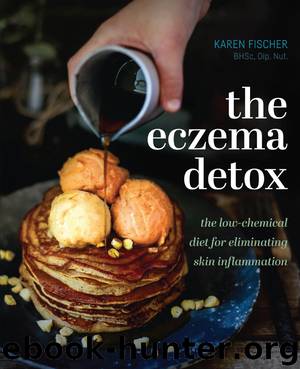The Eczema Detox by Karen Fischer

Author:Karen Fischer
Language: eng
Format: epub
Publisher: Exisle Publishing PTY Ltd.
Published: 2018-05-21T04:00:00+00:00
Problem solving
After doing the FID Program or Eczema Detox Program, you might find you need to test additional foods. If you have any questions please refer to the FAQ and problem solving pages at www.eczemalife.com. These pages are updated regularly and it has some useful tips.
PART 4
helpful advice
Chapter 11
Babies with eczema
Babies can develop eczema before they reach the age of one, and it’s important to avoid panicking if this occurs. As mentioned before, infants under the age of two naturally have under-functioning livers and this makes them prone to problems such as jaundice, cradle cap and eczema. It is perfectly normal for the liver to be unable to detoxify chemicals properly, which is why baby products usually contain fewer chemicals and are labelled ‘hypoallergenic’ (although many of these products are still loaded with chemicals!).
While your baby’s only food source is milk (either breastmilk or formula), you have several ways to modify what types of nutrients he or she receives.
Breastfeeding tips
»
When you are breastfeeding, the essential fatty acids, vitamins and minerals from your diet pass into your breastmilk, and your child’s body uses these nutrients for growth, repair and maintenance.
»
While you are breastfeeding, you can modify your own meals to be lower in natural plant chemicals and change the nutrient composition.
»
You can avoid consuming the foods that are known to exacerbate eczema (see the ‘Itchy Dozen worst foods for eczema’ on p. 16).
»
Alternatively, you can wait until your baby is older and on solid foods before beginning his or her treatment.
»
You can also take skin supplements that are suitable for use during breastfeeding.
Note that babies are not to be directly given vitamin supplements (unless it is a suitable probiotic or prescribed), and breastfeeding mothers need their energy so ensure you are eating enough.
If you have a colicky or ‘windy’ baby, you might also need to avoid garlic, leeks and spring onions (shallots/scallions). Use the Eczema Detox food shopping list (the less restricted program), which is on pp. 92–3.
Infant formula
If your baby is drinking infant formula, speak to your paediatrician or doctor about changing your baby to a low-allergy, non-dairy formula.
Starting solids
Recent research shows that delaying the introduction of solids for more than six months can increase the risk of allergy and eczema so the current recommendation is to start your baby on solids after four months of age, unless advised otherwise by your paediatrician or doctor. This is a general recommendation and may not be suitable for all babies.
For example, your baby needs to be able to sit upright while eating and if your baby is not showing signs of being ready for solids you can delay introducing solids for up to six months.
Tips for starting solids
»
‘One new food every three days …’ To identify allergies and intolerances, introduce each new food on its own and then continue with that food for three days before introducing the next food.
»
It is a good idea to introduce new foods earlier in the day, rather than at bedtime, as once your baby is in bed you can’t see if they are having an adverse reaction.
Download
This site does not store any files on its server. We only index and link to content provided by other sites. Please contact the content providers to delete copyright contents if any and email us, we'll remove relevant links or contents immediately.
How to Be a Bawse: A Guide to Conquering Life by Lilly Singh(7486)
Deep Work by Cal Newport(7083)
The Longevity Diet by Valter Longo(5064)
The Fat Loss Plan by Joe Wicks(4920)
The Four-Pack Revolution by Chael Sonnen & Ryan Parsons(3978)
The Ultimate Bodybuilding Cookbook by Kendall Lou Schmidt(3945)
The French Women Don't Get Fat Cookbook by Mireille Guiliano(3661)
Not a Diet Book by James Smith(3425)
Super Food Family Classics by Jamie Oliver(3416)
Factfulness_Ten Reasons We're Wrong About the World_and Why Things Are Better Than You Think by Hans Rosling(3237)
Turn Up Your Fat Burn! by Alyssa Shaffer(3217)
Self-Esteem by Matthew McKay & Patrick Fanning(3144)
Tom Kerridge's Dopamine Diet: My low-carb, stay-happy way to lose weight by Kerridge Tom(3110)
Body Love by Kelly LeVeque(3058)
The Unbecoming of Mara Dyer by Michelle Hodkin(3045)
Tone Your Tummy Type by Denise Austin(2846)
The Fat Chance Cookbook by Robert H. Lustig(2836)
LL Cool J's Platinum 360 Diet and Lifestyle by LL Cool J(2736)
Men's Health Best by Men's Health Magazine(2602)
